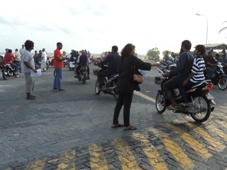With additional reporting by Zaheena Rasheed
Tourism Minister Ahmed Adeeb has responded to critics of his government’s Special Economic Zones (SEZ) bill, arguing that stimulating regional infrastructure will lead to long term development.
“I think the critics have got it wrong, they believe we are trying to centralise all the housing and everything to Malé – bringing all the people from here and there and then giving all those islands to corporates,” Adeeb told Minivan News today.
The SEZ bill – recently introduced to the People’s Majlis – gives the government the authority to relax regulations for foreign investors in designated regions, prompting fears that local autonomy will be lost.
Adeeb – also head of the cabinet’s economic council – said that his government strongly believed in a model of development followed by decentralisaton, arguing that the Maldives did not yet have enough resources to facilitate devolution.
“Land, labour, and capital – the central government and the regional governments are fighting for it as we don’t have enough resources even for the existing government to cover the budget deficits.”
“I believe when there’s enough economic activity we can give more powers to the councils,” he continued.
The aim of the bill was to encourage further development of tourism outside of the central atolls – or the ‘sea plane zone’, he added, referring to the proximity from Malé’s international airport.
“Even you see even President Nasheed’s guest houses, it’s getting centralised in Malé because it’s more feasible here,” he explained.
“I believe that by doing the SEZ Act, we will bring the investment to these regions and this is the real decentralisation of investments.”
Incentives
The bill has been touted as a way to incentivise investors as the government works to attract new development after years of political instability.
“Our total focus in on economics – we are not running behind our political opponents and we have stopped political rhetoric now – we have stopped responding to that but we are responding to economic issues,” said Adeeb.
Envisioning up to nine zones designated by a 17-member board consisting largely of government officials, the legislation includes the development of industrial, free-trade, offshore finance, and high-tech zones.
Article 33 makes clear that, once designated an SEZ, local councils will no longer have authority over the area.
Adeeb explained that, while consultations would be held with local authorities, the details of the incentives granted to incoming investors would be at the discretion of the central government.
“There will be consultations with the local councils, but the decision making power will be here because we want to take decisions very fast and we want development as soon as possible.”
“If Singapore had been reluctant, and had not taken the decisions they had taken, they would never have reached the economic development they have,” he added.
Although the government has expressed hope that the move could pave the way to an economy less reliant on the tourism industry, Article 74 allows up to 40 percent of any zone to be tourist-related development.
The bill requires the Maldives Customs Service to formulate regulations for each zone, while a zone administration office will provide security services.
Article 77 mandates that only 10 percent of technical experts can be foreign, though this can be overridden by the investment board – which can also add a number of additional incentives to contracts such as extended tax relief, and leasing land to foreign companies for up to 99 years.
“It will be according to investment size and scope,” explained Adeeb. “The law gives the power to give even one hundred percent of those [incentives] but that doesn’t mean that the government will act on that.”
Critics
The bill’s most prominent skeptic so far has been MMA Governor Dr Azeema Adam who has suggested that, without enhancing local employment, the bill will offer little immediate regional benefit the regions.
“In the special economic zones, developers have the right to bring any amount of expatriate workers as well, so we might be able to generate jobs, but if those jobs go to expatriates we are not going to reap the benefit of such development activities,” said Dr Azeema – who will sit on the investment board should the bill be passed.
Salma Fikry, a former recipient of a President’s Award for services to decentralisation, has suggested that the bill works against the spirit of devolved government – shifting power from elected representatives to corporations.
“Corporations don’t work for the public good, they work for corporate profit. Is Adeeb saying he is satisfied with trickle down economics?” she asked.
“This is leading the ownership of this country’s resources into the hands of a handful of corporations driven by the quest for short-term power and financial gain. It is not sustainable nor empowering for the Maldivian population,” continued Salma.
Elsewhere, the decentralisation advocacy group the Rajjethere Meehun Party has described the bill as “a monster in the making”, while members of the social community ‘The Maldivian Economist’ have questioned the bill’s logic.
“If it is for other industries, why so many benefits to tourism sector in SEZ bill?” asked the group, noting that the industry is currently thriving – with resorts often in close proximity to local councils.


